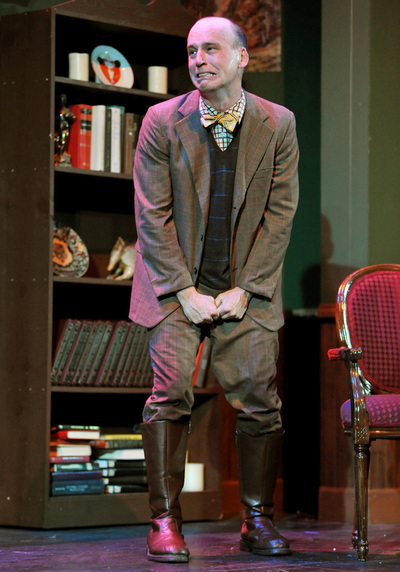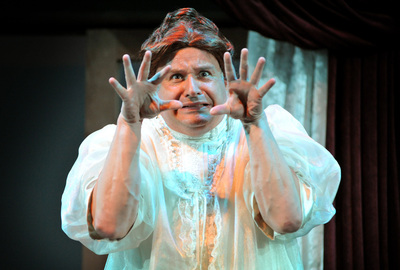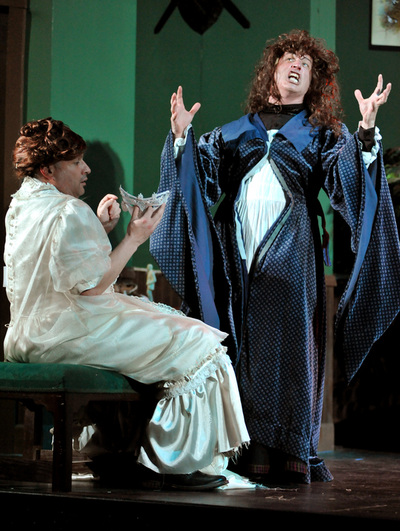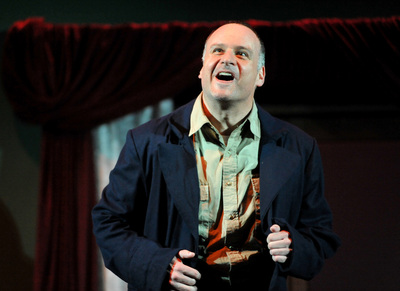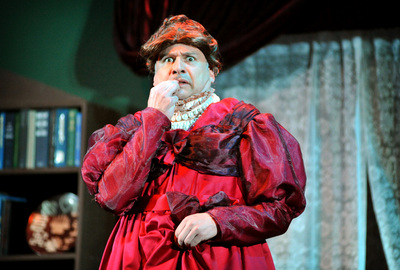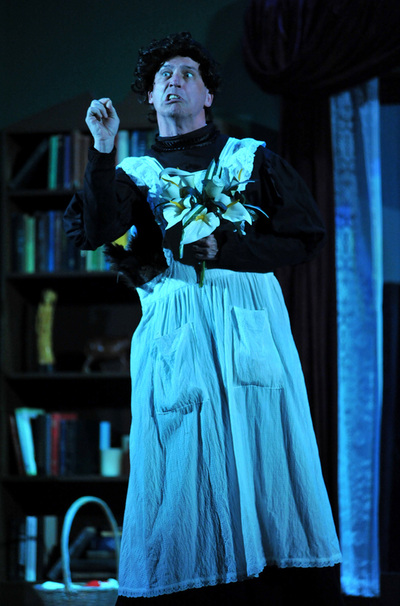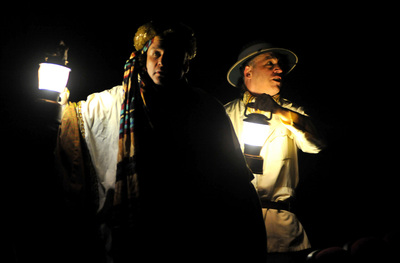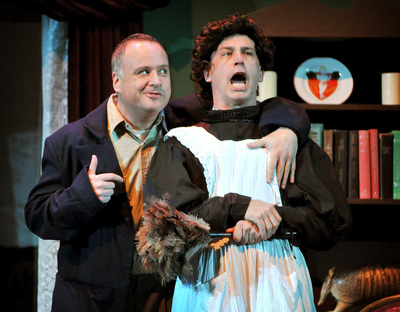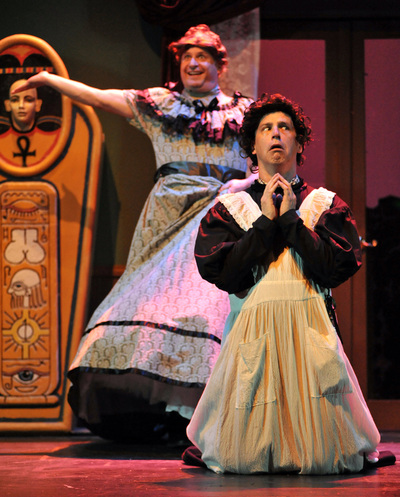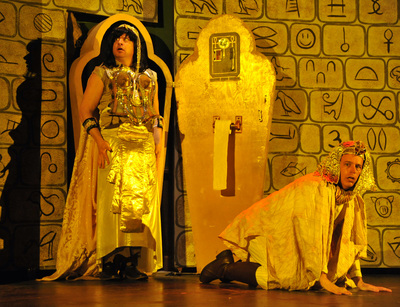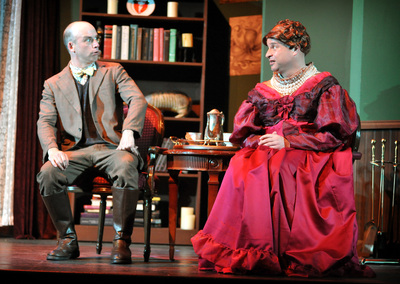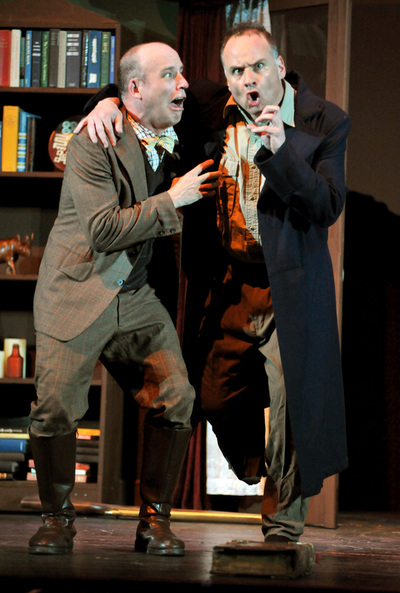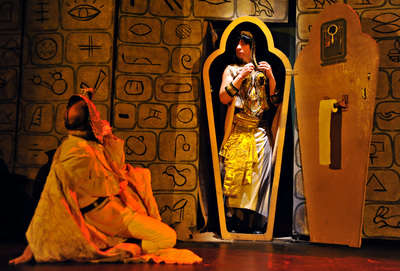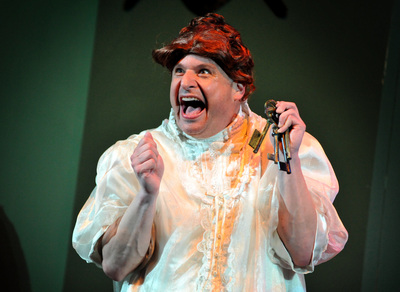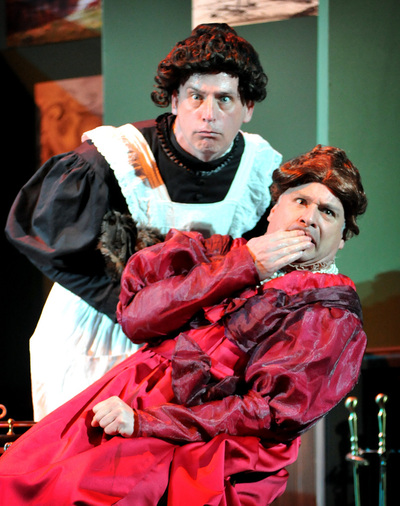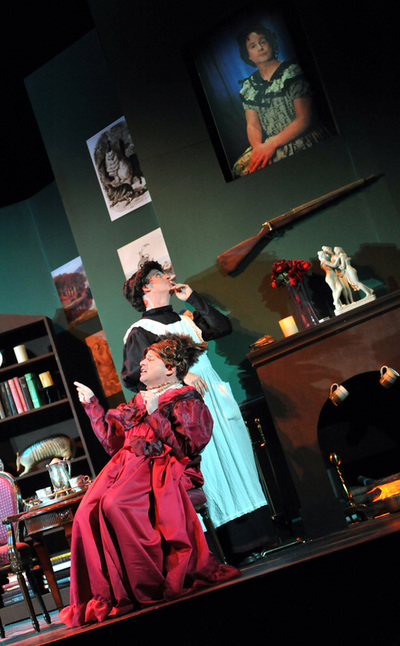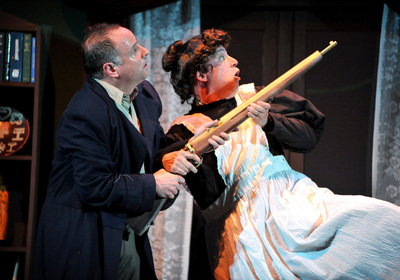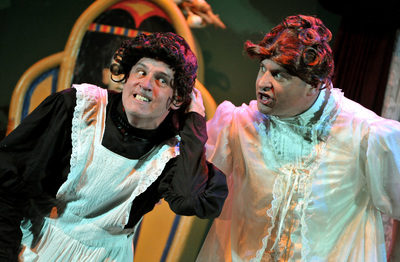The Mystery of Irma Vep
Bag & Baggage Productions, The Venetian Theatre, Hillsboro OR, May 11 - 29, 2011
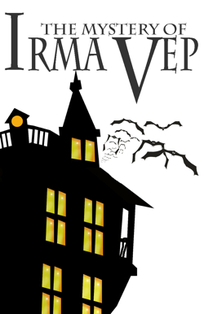
Director: Patrick Spike
Stage Manager: Becci Swearingen
Asst. Stage Manager / Dresser: Kirk Webster
Asst. Stage Manager / Sound Op: Sarah Layton
Scenic Designer: Carl Hamilton
Costume Designer: Allison Dawe
Lighting Designer: Jonathan "Bearclaw" Hart
Sound Eng./Designer
Props Master: Sarah Lydecker
Tech Dir / Master Builder: Demetri Pavlatos
Production Intern / Light Op: Anni Reilly
Production Intern / Dresser: Matt Kishlock
Edgar, Jane, Intruder: Scot Carson
Nicodemus, Enid, Pev, Alcazar: Jason Glick
Stage Manager: Becci Swearingen
Asst. Stage Manager / Dresser: Kirk Webster
Asst. Stage Manager / Sound Op: Sarah Layton
Scenic Designer: Carl Hamilton
Costume Designer: Allison Dawe
Lighting Designer: Jonathan "Bearclaw" Hart
Sound Eng./Designer
Props Master: Sarah Lydecker
Tech Dir / Master Builder: Demetri Pavlatos
Production Intern / Light Op: Anni Reilly
Production Intern / Dresser: Matt Kishlock
Edgar, Jane, Intruder: Scot Carson
Nicodemus, Enid, Pev, Alcazar: Jason Glick
Photography by Casey Campbell. These photos are the property of Patrick Spike, please do not duplicate, download, copy or print without expressed permission. Thank you.
The Buzz
Oregonian Review:
"Even if you don't have a thing for ghost plays and gothic tales, you'll probably get a kick out of Charles Ludlam's 1984 play, The Mystery of Irma Vep." - by Richard Wattenberg, 5/14/11.
Director's Note for Playbill
"camp" - Noun Deliberately exaggerated and theatrical behavior or style
I first encountered this crazy play, and Charles Ludlam as a playwright in about 1994 when I was hired to perform the show, along with 'Greater Tuna' for one summer in Montana. We played Vep first, then opened Tuna a couple weeks after, then had to remount Vep back in Washington state a mere three days after closing Tuna, with an entirely new stage crew. As you watch, you'll have a sense of what a challenge that was, and how schizophrenic I felt at the time. But despite, it remains one of my favorite experiences (and stories to tell) as an actor.
When Scott decided to make this part of the season with Bag&Baggage I was jumping up and down (on the inside) to direct, and revisit this wacky monster of a show.
We often say that the most enjoyable things to do, are those things that challenge us in a variety of ways. Challenge keeps things fresh, not stale, and brings out of us our best and most creative thinking and work. This show can be said to be a testament to that idea. Ludlam set out to challenge not only his team, but also his audiences and the mores and morals of the time. The ridiculous theatre movement itself came about out of an effort to bend theatre and entertainment status quo on its ear. It poked fun at things being taken for granted, or being readily accepted; things in need of some reevaluating. What started out being seen as fun, frivolous and even foolish, soon was recognized as something more. It was political and provocative and pushed people's buttons. Along the way, he created a piece that is one of the most challenging things I've ever worked on, in its acting, directing and production elements.
Historically we can look back and see that the Ridiculous Theater Company and others like it helped to shape the cultural landscape of the 1970's. It was one of the birthplaces of "camp" performance and art. At the same time Glam Rock and Disco was raging. Warhol was changing how we saw art and the artist. Quentin Crisp was bending gender norms in person and with the bio film "The Naked Civil Servant," talking about personal style, and Rocky Horror was unleashed on the world. Fashion and art and love were all exploding in new, exploratory and provocative ways. We have Charles Ludlam and his colleagues to thank for blowing apart some long held theatrical and story telling conventions, to pave the way for new forms that delight us in all sorts of mediums today. Some say, had Ludlam survived longer, that he was on his way to becoming the Moliere of our time.
Ultimately, I hope audiences of this production enjoy the ride. We've had a great time preparing to present it to you… if "great time" isn't merely an understatement considering the number of times we were teary-eyed, breathless and red faced from laughter during rehearsals. But at the same time, I hope too that we can collectively imagine back, being in a tiny theatre in New York in the 70's and early 80's, watching the crazy antics of a new style of theatre being born on stage in front of us. Spell bound we'd thrill at this crazy new comic style, honoring and sending up the classics, yet blasting societal norms all the while. It must have been an incredible thing to witness.
Enjoy!
Background on Charles Ludlam & Ridiculous Theatre Company
The Mystery of Irma Vep was first produced by Ludlam's Ridiculous Theatrical Company, opening off-off-Broadway in New York City's Greenwich Village in September 1984 and closing in April 1986. It starred Ludlam as Lady Enid, the new mistress of the manor, and Nicodemus, and Everett Quinton (Ludlam's partner) as Lord Edgar Hillcrest, the master of the manor, and the housekeeper (among other characters). The "Cast and Crew" won a Special Drama Desk Award. Ludlam and Quinton won the 1985 Obie Award for Ensemble Performance.
The show was later produced off-Broadway at the Westside Theatre from September 1998 through July 1999, with Quinton and Stephen DeRosa. The production won the 1999 Lucille Lortel Award for Outstanding Revival, along with Outer Critics Circle Award nominations for Outstanding Revival of a Play, Outstanding Lighting Design (John Lee Beatty), and Outstanding Costume Design (William Ivey Long).
In 1991, Irma Vep was the most produced play in the United States, and in 2003, it became the longest-running play ever produced in Brazil.
Manifesto Ridiculous Theater, Scourge of Human Folly - by Charles Ludlam
Aim: To get beyond nihilism by revaluing combat.
Axioms to a theater for ridicule:
1.You are a living mockery of your own ideals. If not, you have set your ideals too low. 2.The things one takes seriously are one's weaknesses. 3.Just as many people who claim belief in God disprove it with their every act, so too there are those whose every deed, though they say there is no God, is an act of faith. 4.Evolution is a conscious process. 5.Bathos is that which is intended to be sorrowful but because of the extremity of its expression becomes comic. Pathos is that which is meant to be comic but because of the extremity of its expression becomes sorrowful. Some things which seem to be opposites are actually different degrees of the same thing. 6.The comic hero thrives on his vices. The tragic hero is destroyed by his virtue. Moral paradox is the crux of drama. 7.The theater is a humble materialist enterprise which seeks to produce riches of the imagination, not the other way around. The theater is an event not an object. Theater workers need not blush and conceal their desperate struggle to pay the landlords their rents. Theater without the stink of art.
Instructions for use: This is farce not Sunday school. Illustrate hedonistic calculus. Test out a dangerous idea, a theme that threatens to destroy one's whole value system. Treat the material in a madly farcical manner without losing the seriousness of the theme. Show how paradoxes arrest the mind. Scare yourself a bit along the way.
Oregonian Review:
"Even if you don't have a thing for ghost plays and gothic tales, you'll probably get a kick out of Charles Ludlam's 1984 play, The Mystery of Irma Vep." - by Richard Wattenberg, 5/14/11.
Director's Note for Playbill
"camp" - Noun Deliberately exaggerated and theatrical behavior or style
I first encountered this crazy play, and Charles Ludlam as a playwright in about 1994 when I was hired to perform the show, along with 'Greater Tuna' for one summer in Montana. We played Vep first, then opened Tuna a couple weeks after, then had to remount Vep back in Washington state a mere three days after closing Tuna, with an entirely new stage crew. As you watch, you'll have a sense of what a challenge that was, and how schizophrenic I felt at the time. But despite, it remains one of my favorite experiences (and stories to tell) as an actor.
When Scott decided to make this part of the season with Bag&Baggage I was jumping up and down (on the inside) to direct, and revisit this wacky monster of a show.
We often say that the most enjoyable things to do, are those things that challenge us in a variety of ways. Challenge keeps things fresh, not stale, and brings out of us our best and most creative thinking and work. This show can be said to be a testament to that idea. Ludlam set out to challenge not only his team, but also his audiences and the mores and morals of the time. The ridiculous theatre movement itself came about out of an effort to bend theatre and entertainment status quo on its ear. It poked fun at things being taken for granted, or being readily accepted; things in need of some reevaluating. What started out being seen as fun, frivolous and even foolish, soon was recognized as something more. It was political and provocative and pushed people's buttons. Along the way, he created a piece that is one of the most challenging things I've ever worked on, in its acting, directing and production elements.
Historically we can look back and see that the Ridiculous Theater Company and others like it helped to shape the cultural landscape of the 1970's. It was one of the birthplaces of "camp" performance and art. At the same time Glam Rock and Disco was raging. Warhol was changing how we saw art and the artist. Quentin Crisp was bending gender norms in person and with the bio film "The Naked Civil Servant," talking about personal style, and Rocky Horror was unleashed on the world. Fashion and art and love were all exploding in new, exploratory and provocative ways. We have Charles Ludlam and his colleagues to thank for blowing apart some long held theatrical and story telling conventions, to pave the way for new forms that delight us in all sorts of mediums today. Some say, had Ludlam survived longer, that he was on his way to becoming the Moliere of our time.
Ultimately, I hope audiences of this production enjoy the ride. We've had a great time preparing to present it to you… if "great time" isn't merely an understatement considering the number of times we were teary-eyed, breathless and red faced from laughter during rehearsals. But at the same time, I hope too that we can collectively imagine back, being in a tiny theatre in New York in the 70's and early 80's, watching the crazy antics of a new style of theatre being born on stage in front of us. Spell bound we'd thrill at this crazy new comic style, honoring and sending up the classics, yet blasting societal norms all the while. It must have been an incredible thing to witness.
Enjoy!
Background on Charles Ludlam & Ridiculous Theatre Company
The Mystery of Irma Vep was first produced by Ludlam's Ridiculous Theatrical Company, opening off-off-Broadway in New York City's Greenwich Village in September 1984 and closing in April 1986. It starred Ludlam as Lady Enid, the new mistress of the manor, and Nicodemus, and Everett Quinton (Ludlam's partner) as Lord Edgar Hillcrest, the master of the manor, and the housekeeper (among other characters). The "Cast and Crew" won a Special Drama Desk Award. Ludlam and Quinton won the 1985 Obie Award for Ensemble Performance.
The show was later produced off-Broadway at the Westside Theatre from September 1998 through July 1999, with Quinton and Stephen DeRosa. The production won the 1999 Lucille Lortel Award for Outstanding Revival, along with Outer Critics Circle Award nominations for Outstanding Revival of a Play, Outstanding Lighting Design (John Lee Beatty), and Outstanding Costume Design (William Ivey Long).
In 1991, Irma Vep was the most produced play in the United States, and in 2003, it became the longest-running play ever produced in Brazil.
Manifesto Ridiculous Theater, Scourge of Human Folly - by Charles Ludlam
Aim: To get beyond nihilism by revaluing combat.
Axioms to a theater for ridicule:
1.You are a living mockery of your own ideals. If not, you have set your ideals too low. 2.The things one takes seriously are one's weaknesses. 3.Just as many people who claim belief in God disprove it with their every act, so too there are those whose every deed, though they say there is no God, is an act of faith. 4.Evolution is a conscious process. 5.Bathos is that which is intended to be sorrowful but because of the extremity of its expression becomes comic. Pathos is that which is meant to be comic but because of the extremity of its expression becomes sorrowful. Some things which seem to be opposites are actually different degrees of the same thing. 6.The comic hero thrives on his vices. The tragic hero is destroyed by his virtue. Moral paradox is the crux of drama. 7.The theater is a humble materialist enterprise which seeks to produce riches of the imagination, not the other way around. The theater is an event not an object. Theater workers need not blush and conceal their desperate struggle to pay the landlords their rents. Theater without the stink of art.
Instructions for use: This is farce not Sunday school. Illustrate hedonistic calculus. Test out a dangerous idea, a theme that threatens to destroy one's whole value system. Treat the material in a madly farcical manner without losing the seriousness of the theme. Show how paradoxes arrest the mind. Scare yourself a bit along the way.
